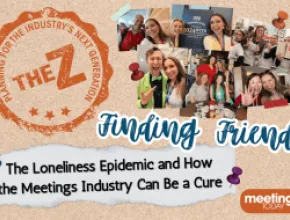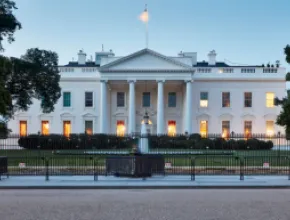The Trump Administration’s influence on the medical meetings industry will depend on multiple factors, including the president-elect’s policies, public sentiment and economic priorities.
Here are some possible areas of impact planners of medical meetings and their organizations should consider:
1. Healthcare Policy and Funding

- Regulatory changes: Donald Trump’s previous focus on deregulation could potentially simplify processes for clinical trials or medical research, but this might also raise concerns about oversight and safety.
- Pharmaceutical pricing: Trump has emphasized lowering drug prices, which could shift priorities for pharma companies. This might affect the budgets available for medical meetings and conventions.
- Insurance coverage: If changes to healthcare legislation were enacted, they could influence patient care models and research funding, indirectly impacting topics and attendance at meetings.
2. Travel and Immigration Policies
- Visa restrictions: Policies on visas and immigration could affect international attendance at U.S.-based medical congresses, impacting global collaboration in science and medicine.
- Trade relations: Tariffs or tensions with specific countries could affect partnerships with international organizations or sponsors of medical events.
3. Corporate and Pharma Investments
- If economic policies under the Trump Administration are perceived as beneficial to big corporations, pharmaceutical companies may see increased profits, which could translate to more robust investment in medical education, sponsorships and events.
- Conversely, if budgets are constrained by new pricing regulations, it could lead to reduced spending on meetings and conventions.
4. Public Perception and Advocacy
Trump’s stance on COVID-19 and other health issues has been polarizing. This could influence attendance or the thematic focus of medical events, particularly where topics like pandemic preparedness or public health strategies are central.
[Related: A Medical Meetings Expert’s Take on New Challenges Facing That Industry Segment]
5. Industry Innovation
- Focus on American innovation: If policies incentivize domestic innovation, there could be a rise in U.S.-based medical research and meetings showcasing advancements.
6. Global Competition
- If international relations grow tense, some foreign entities might choose non-U.S. destinations for medical conferences, especially in Europe or Asia.
How You Can Prepare
As a global director of meetings, you might want to prepare for these potential shifts by focusing on flexible planning strategies, monitoring regulatory updates and staying aligned with corporate priorities. Engaging with key stakeholders to assess their perspectives on the political climate will also help in forecasting the potential impacts.
If the administration were to revisit previous healthcare policies during its next term, it might aim to modify, scale back or alter programs like Open Payments, a transparency initiative under the Affordable Care Act (ACA). Open Payments, managed by the Centers for Medicare & Medicaid Services (CMS), requires pharmaceutical and medical device companies to report financial relationships with physicians and teaching hospitals.
Potential Impacts of a Trump Presidency on Open Payments
1. Deregulation Focus
- Trump's prior focus on reducing regulatory burdens for businesses could lead to attempts to weaken reporting requirements for Open Payments. This might include raising the dollar threshold for reporting or narrowing the types of transactions that must be disclosed.
- Pharmaceutical and device companies may advocate for fewer restrictions to reduce compliance costs, which could resonate with Trump's pro-business agenda.
2. Reduced Enforcement or Oversight
- If funding for CMS or other oversight bodies is reduced, enforcement of Open Payments requirements could become less rigorous, leading to fewer audits or investigations into noncompliance.
3. Transparency Balancing Act
- While Trump often supported deregulatory policies, he also spoke about drug price transparency and reducing healthcare costs. Maintaining or even expanding Open Payments might align with a populist message of holding large companies accountable, particularly if it’s framed as benefiting patients.
4. Indirect Impacts from ACA Revisions
- Any effort to repeal or replace parts of the ACA could put programs like Open Payments at risk of elimination or modification, as they are tied to the ACA infrastructure.
5. Impact on Industry Relationships
- If changes are made to reporting requirements, they could alter the visibility of financial relationships between healthcare providers and industry. This might affect public trust and perceptions about the influence of industry funding in medicine.
What This Means for Medical Meetings
Changes to Open Payments could influence how pharmaceutical and device companies approach sponsorship and education at medical meetings. If reporting thresholds are raised or requirements are reduced, companies may feel less constrained in supporting events or covering expenses like speaker fees, travel and meals.
Conversely, stricter rules could lead to more conservative spending, impacting funding for educational initiatives and collaborations.
The future of Open Payments under Trump would depend on the administration’s prioritization of healthcare reform versus deregulation. It’s a dynamic area to watch closely as shifts could significantly affect compliance, industry behaviors and funding within the medical meeting sector.
The Trump Administration’s potential impact on the Open Payments program under the ACA would depend on his broader healthcare agenda and regulatory priorities.
Here’s what to consider:
1. Background on Open Payments
- The Open Payments program requires pharmaceutical companies and medical device manufacturers to disclose financial relationships with healthcare providers. This promotes transparency to prevent conflicts of interest in medical research, education and practice.
2. Trump's Healthcare Focus
- Deregulation priority: Trump's previous emphasis on reducing regulatory burdens could mean efforts to streamline or modify Open Payments reporting requirements are a possibility. For example, reporting thresholds or categories might be adjusted to ease compliance for companies.
- Transparency commitments: While Trump has advocated for price transparency in healthcare, his administration showed less focus on regulating industry-physician relationships. This could mean a shift away from expanding the scope of Open Payments.
3. Potential Changes
- Scale-back of ACA provisions: If Trump pushes for changes to ACA-related programs, Open Payments might face reduced enforcement or budget cuts. However, the program has bipartisan support for its role in ensuring accountability, making a complete rollback unlikely.
- Impact on reporting requirements: There could be efforts to adjust reporting criteria to favor industry stakeholders, potentially reducing the granularity of publicly available data.
4. Industry and Meeting Implications
- Pharma and device manufacturers: If reporting becomes less stringent, companies might allocate more resources to physician engagements, including medical education and meeting sponsorships.
- Public perception: A less-transparent system could face criticism, potentially affecting trust in the healthcare system and increasing scrutiny at medical meetings.
Overall, any direct changes to Open Payments would reflect Trump’s broader regulatory goals and healthcare priorities, balancing industry support with public demands for transparency. It’s worth monitoring legislative and regulatory developments closely for any concrete proposals.
Potential Effects of RFK Jr. HHS Leadership on Medical Meetings
As secretary of the Department of Health and Human Services (HHS), nominee Robert F. Kennedy Jr.'s potential influence on the medical meetings industry would hinge on his policies, public health priorities and the reception of his views on vaccines and healthcare.
Here are some key areas where his impact could manifest:
1. Vaccine Policies and Public Health
- Controversial vaccine stance: Kennedy has been a prominent critic of certain vaccine policies, advocating for transparency and vaccine safety.
This could:
- Influence meeting topics related to immunology, vaccine development and public health.
- Shift the focus of discussions at conferences to include debates on vaccine mandates, safety protocols and alternative approaches to public health.
- Polarization of attendees: Kennedy’s stance might attract supporters and skeptics alike, leading to more dynamic, and possibly contentious, dialogue at medical meetings.
2. Regulatory and Policy Changes
- Increased scrutiny on pharma: If Kennedy pursues policies emphasizing corporate accountability, pharmaceutical companies may face stricter regulations. This could affect their budgets for sponsoring medical education and events.
- Research funding realignment: Changes in funding priorities—for instance, emphasizing environmental health or alternative medical approaches—could impact the types of research showcased at meetings.
3. Public Perception and Attendance
- Boosted engagement: Kennedy’s controversial views might increase interest in meetings covering contentious topics like vaccine policies, environmental health impacts on disease or emerging health threats.
- Potential divisions: Public debates surrounding his policies might create challenges for organizers in maintaining neutrality and inclusivity at events.
4. Travel and Event Logistics
- Global collaboration: If Kennedy’s policies affect international health partnerships, it might influence global attendance or the structure of internationally focused meetings.
- Corporate sponsorship shifts: Companies might recalibrate their involvement based on the political climate and Kennedy's relationship with the pharmaceutical industry.
5. Environmental Focus
Kennedy is a strong environmental advocate. This could increase interest in topics like:
- The intersection of climate change and public health.
- Sustainable practices in organizing medical meetings, such as reducing the carbon footprint of events.
6. Industry Preparedness
- Heightened need for fact-based discussions: Medical meetings may need to prepare for increased scrutiny and ensure content aligns with evidence-based medicine to counter any misinformation.
- Stakeholder engagement: Kennedy’s potential influence might prompt organizations to engage more actively with policymakers and advocacy groups to shape the narrative around critical issues.
For planners of pharma and medical events, the focus should be on fostering balanced, evidence-driven conversations, anticipating audience sensitivities and staying aligned with emerging trends in public health under Kennedy’s influence.
Potential Effects of Dr. Mehmet Oz as Director of HHS on Medical Meetings
If Dr. Mehmet Oz is appointed as the Secretary of the HHS , his impact on medical meetings could be shaped by his unique background as a physician, media personality and advocate for alternative health practices. Here’s an analysis of potential effects:
1. Influence on Healthcare Policy
Emphasis on preventative and holistic health: Dr. Oz’s public health focus often includes lifestyle medicine, nutrition and alternative therapies.
This could:
- Shift meeting agendas toward wellness, preventive medicine and complementary therapies.
- Increase funding or emphasis on related research and panels at medical conferences.
- Public-private partnerships: His media-friendly approach might encourage initiatives to merge public health campaigns with corporate involvement, potentially increasing sponsorships for meetings addressing broader public health topics.
2. Regulatory Changes
- Inclusion of alternative medicine: Dr. Oz’s support for integrative medicine might lead to HHS programs that endorse or fund alternative treatments. Medical meetings could see expanded tracks on these topics, potentially attracting new audiences and sparking debate.
- Streamlining approvals: His public commentary on healthcare reform suggests a potential push for faster approval of treatments and technologies. This could make innovation a prominent theme in medical meetings.
3. Public Perception and Controversy
- Polarization in medicine: Dr. Oz’s endorsement of certain controversial health products and practices has divided medical professionals.
This might:
- Lead to heightened scrutiny of the content and speakers at meetings, especially on evidence-based medicine.
- Create opportunities for debates or panels addressing scientific rigor and misinformation.
- Increased media attention: His high-profile nature might draw media coverage to health-related meetings, increasing visibility for certain events.
4. Industry Implications
In the pharmaceutical and device sector, Dr. Oz’s approach could lead to:
- Greater focus on lifestyle-related health interventions, shifting priorities for companies sponsoring traditional medical technologies or treatments.
- Potential budget reallocations toward wellness and public health education initiatives.
- Healthcare innovation: His interest in emerging technologies might spur growth in meetings featuring digital health, AI and personalized medicine.
5. Global and Environmental Focus
- Broadening public health themes: Under Oz, HHS might prioritize topics like obesity, mental health and chronic disease prevention, influencing the agendas of medical conferences globally.
- Sustainability and accessibility: His media campaigns often touch on accessible healthcare solutions, which could encourage discussions on equity and environmental health at meetings.
6. Challenges and Opportunities for Meeting Planners
- Balancing diverse opinions: Planners may need to account for increased debate and potential controversy, ensuring a platform for balanced, evidence-based dialogue.
- Leveraging popularity: His name recognition and communication skills could attract broader audiences to events addressing public health and wellness topics.
In summary, if Dr. Oz heads HHS, his influence could introduce both opportunities and challenges, reshaping medical meetings to emphasize holistic health, innovation and public engagement while sparking discussions on scientific rigor and public trust in health information.






